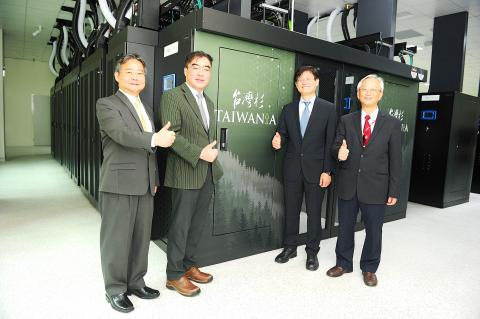The National Applied Research Laboratories (NARL) on Monday unveiled the Taiwania, the most powerful supercomputer that has yet been built indigenously for publicly funded research.
Operating at peak efficiency, Taiwania can perform up to 1.33 quadrillion floating-point operations per second (petaflops) and has 3.4 petabytes of storage, NARL National Center for High-Performance Computing official Lu Hung-fu (盧鴻復) said.
When the graphics processing units’ (GPU) capacity is added to the total computing power, Taiwania’s performance increases to 1.7 petaflops, he said.

Photo: Chien Hui-ju, Taipei Times
The supercomputer consists of 630 pure central processing units (CPUs) and 64 mixed central and graphics processing units, which boast a total of 25,200 Intel cores and 256 Nvidia P100 GPU accelators, he said.
The two-year program to build the cluster cost NT$430 million (US$14.44 million), he said.
The new supercomputer is vastly superior to the Advanced Large-scale Parallel Supercluster (ALPS) — also known as Windrider — that used to be the NARL’s most powerful cluster, he said.
Taiwania has seven times the processing power of ALPS, while its energy efficiency of 4 gigaflops per watt is an order of magnitude better, the center said.
Additionally, Taiwania’s high-density design is more volume-efficient at one-third the size of ALPS, the center said.
Taiwania is the first state-owned supercomputer to perform at petascale speeds and it was built to meet the high-performance computing needs of the nation’s research institutions, center director-general Shieh Ce-kuen said.
Taiwania has a wide range of practical applications in the simulation and analysis of complex phenomena, which facilitates biomedical research, such as gene or neurological pathway mapping, Hsieh said.
Taiwania’s computing ability will allow Taiwanese neuroscientists to scale up their neurological mapping studies from fruit fly brains of 130,000 neurons to mice brains of 70 million neurons, he said.
Such research could lead to faster medical diagnoses of hereditary conditions and deepen the understanding of neurological diseases, such as Parkinson’s and Alzheimer’s, he said.
Furthermore, Taiwania could be used for air pollution-related research and provide faster alerts for dangerous air quality conditions, he said.
Taiwania is scheduled to be activated today and private research groups may utilize the cluster for an hourly fee of NT$0.7, he said.
NARL is to decommission its older supercomputers ALPS, Iris and Formosa 5 by no later than September, he said.

DAREDEVIL: Honnold said it had always been a dream of his to climb Taipei 101, while a Netflix producer said the skyscraper was ‘a real icon of this country’ US climber Alex Honnold yesterday took on Taiwan’s tallest building, becoming the first person to scale Taipei 101 without a rope, harness or safety net. Hundreds of spectators gathered at the base of the 101-story skyscraper to watch Honnold, 40, embark on his daredevil feat, which was also broadcast live on Netflix. Dressed in a red T-shirt and yellow custom-made climbing shoes, Honnold swiftly moved up the southeast face of the glass and steel building. At one point, he stepped onto a platform midway up to wave down at fans and onlookers who were taking photos. People watching from inside

A Vietnamese migrant worker yesterday won NT$12 million (US$379,627) on a Lunar New Year scratch card in Kaohsiung as part of Taiwan Lottery Co’s (台灣彩券) “NT$12 Million Grand Fortune” (1200萬大吉利) game. The man was the first top-prize winner of the new game launched on Jan. 6 to mark the Lunar New Year. Three Vietnamese migrant workers visited a Taiwan Lottery shop on Xinyue Street in Kaohsiung’s Gangshan District (崗山), a store representative said. The player bought multiple tickets and, after winning nothing, held the final lottery ticket in one hand and rubbed the store’s statue of the Maitreya Buddha’s belly with the other,

‘NATO-PLUS’: ‘Our strategic partners in the Indo-Pacific are facing increasing aggression by the Chinese Communist Party,’ US Representative Rob Wittman said The US House of Representatives on Monday released its version of the Consolidated Appropriations Act, which includes US$1.15 billion to support security cooperation with Taiwan. The omnibus act, covering US$1.2 trillion of spending, allocates US$1 billion for the Taiwan Security Cooperation Initiative, as well as US$150 million for the replacement of defense articles and reimbursement of defense services provided to Taiwan. The fund allocations were based on the US National Defense Authorization Act for fiscal 2026 that was passed by the US Congress last month and authorized up to US$1 billion to the US Defense Security Cooperation Agency in support of the

‘COMMITTED TO DETERRENCE’: Washington would stand by its allies, but it can only help as much as countries help themselves, Raymond Greene said The US is committed to deterrence in the first island chain, but it should not bear the burden alone, as “freedom is not free,” American Institute in Taiwan Director Raymond Greene said in a speech at the Institute for National Defense and Security Research’s “Strengthening Resilience: Defense as the Engine of Development” seminar in Taipei yesterday. In the speech, titled “Investing Together and a Secure and Prosperous Future,” Greene highlighted the contributions of US President Donald Trump’s administration to Taiwan’s defense efforts, including the establishment of supply chains for drones and autonomous systems, offers of security assistance and the expansion of